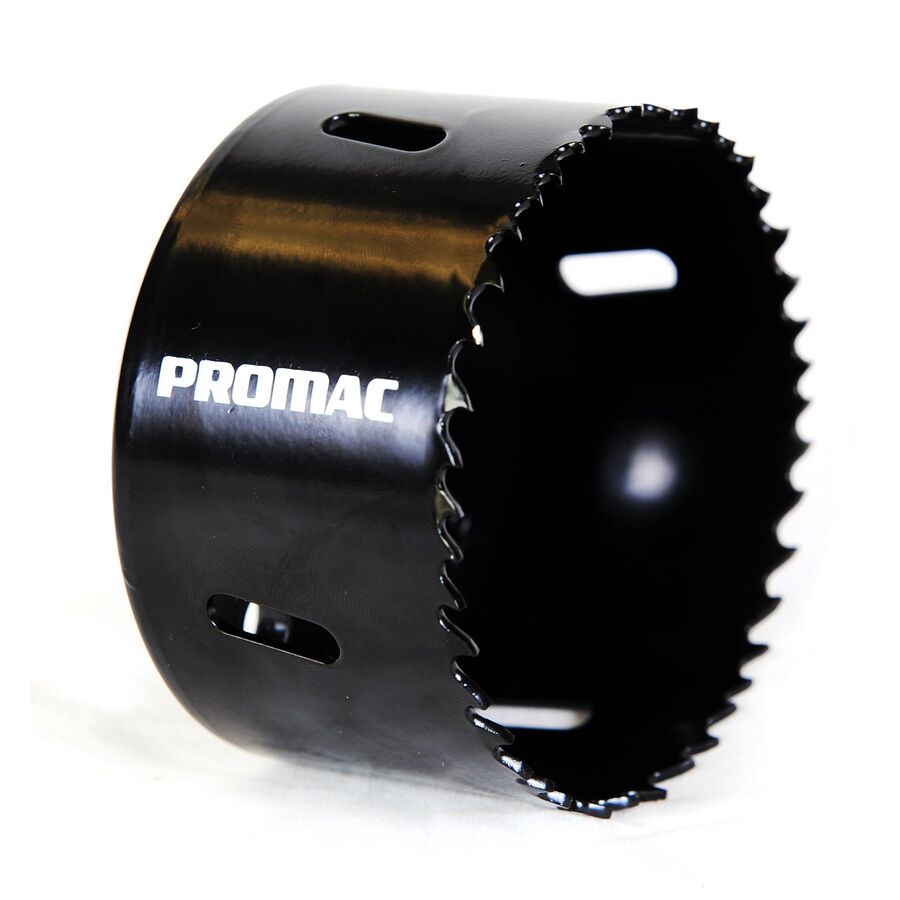Kingsgrove Branch:
Holesaw

G'day! You're in the middle of a reno, ready to run some new plumbing pipes or install a new set of downlights. You grab your drill, look at your biggest drill bit, and realise it's about as useful as an ashtray on a motorbike – it's just not big enough.
Trying to cut a big, round hole with a jigsaw is a recipe for a wobbly line that looks like a dog's breakfast. For a clean, fast, perfectly round hole, you need the right tool for the job. You need a holesaw.
So, What is a Holesaw, Exactly?
A holesaw (or 'hole saw') isn't a single drill bit. It's a clever, multi-part system that works as a team. It's made of three key bits:
- The Holesaw (The 'Cup'): This is the main part. It's the big, round, cup-shaped blade with the teeth that does the actual cutting.
- The Arbor (or Mandrel): This is the shaft that locks into your drill's chuck. The holesaw cup screws onto this arbor.
- The Pilot Drill Bit: This is a standard twist drill bit that sits in the centre of the arbor. This is the real hero – it drills a small hole first to keep the whole thing perfectly centred and stops the big saw from "walking" all over your wall.
It's the fair dinkum, go-to solution for any tradie or DIYer who needs to cut a clean, circular hole in just about any material.
The Ripper Benefits: Why You Need One
- It's the Only Way to drill a clean, large-diameter hole (e.g., from 19mm up to 150mm+).
- It's Versatile: You can get holesaw cups for timber, metal, plastic, and even tiles.
- It's Clean: It cuts a neat 'plug' or 'slug' out of the material, leaving you with a schmick, round hole.
Choosing Your Weapon: The Main Types
This is the most important part, mate. You can't use a timber bit on hard steel. You've got to match the blade to the job.
1. Bi-Metal Holesaw (The All-Rounder)
This is the one you'll find in every tradie's kit. It's a tough, flexible blade with high-speed steel (HSS) teeth.
- Best for: Timber (pine, hardwood), plasterboard (Gyprock), plastics (like conduit), and thin metals (like aluminium or sheet steel). A good electrical wholesaler will stock these as the standard for electricians.
2. TCT (Tungsten Carbide Tipped) Holesaw
This is the heavy hitter. It has a few, very aggressive, tough-as-nails carbide teeth.
- Best for: Hard, abrasive materials. Think fibre cement sheeting, MDF, fibreglass, and thicker metals. It's much faster and tougher than a bi-metal bit for these jobs.
3. Diamond Holesaw (The Specialist)
This one doesn't have "teeth" at all. Its edge is coated in industrial-grade diamond grit.
- Best for: This is the only choice for drilling into hard porcelain tiles, glass, or stone. It grinds the material, it doesn't cut it.
- Hot Tip: You must use these with water to keep them cool, or you'll knacker the bit in seconds.
A CRITICAL Safety Warning: DIY vs. Pro
Righto, let's get dead serious for a sec.
- DIY (Have a go!): Using a holesaw to cut a hole in timber, plasterboard, or a bit of metal in your shed is a classic (if careful) DIY job. Wear your safety glasses, mate!
- PRO ONLY (Stop!): What if you're using that holesaw to cut a 90mm hole in your ceiling for a new 240V downlight?
Cutting the hole is one thing, but the job of reaching into that ceiling, pulling down the 240V wiring, and connecting the new light fitting is 100% NOT A DIY JOB.
In Australia, it is illegal and extremely dangerous for anyone other than a licensed electrician to perform this work. A simple mistake can lead to a fatal electric shock or a house fire. Don't be a galah.
A Professional Job Needs Professional Gear
A licensed professional knows that a schmick, reliable job depends on using high-quality, trade-grade tools and components. They won't risk their reputation on a dodgy, cheap holesaw that cuts a hole on the piss. They get their gear from a trusted electrical wholesaler.
As one of Australia's most comprehensive electrical wholesaler and supplier networks, Schnap Electric Products stocks the lot for the professional installer. They've got a massive range of high-quality holesaw kits (Bi-Metal, TCT, and Diamond), alongside all the professional-grade, compliant components that a qualified professional needs to install into those holes – from IC-rated LED downlights and weatherproof junction boxes to conduits and cable glands. For a job that's safe, compliant, and built to last, the pros start with quality gear from a supplier like Schnap Electric.
Recent posts

Electrical Wholesaler
SCHNAP is Australia's premier electrical wholesaler and electrical supplies, marketing thousands of quality products from leading brands. Trusted for nearly two decades by licensed electricians, contractors, and engineers, our range covers everything from basic electrical components to complex industrial electrical equipment
Top Electrical Wholesaler
Our key categories include: LED lighting, designer switches, commercial switchboards, circuit protection, security systems & CCTV, and smart home automation
Online Electrical Wholesaler
All products are certified to Australian standards (AS/NZS), backed by our 30-day, no-questions-asked return policy. Our expert technical team helps you quickly source the right solution for any residential, commercial, or industrial project, with daily dispatch from our Sydney electrical warehouse delivering Australia-wide
Best Electrical Supplies
SCHNAP offers the most comprehensive electrical product range, with full technical specifications, application details, installation requirements, compliance standards, and warranties — giving professionals total confidence in every purchase
Customer Support
Information
Contact Us
-
-
-
-
Mon - Fri: 6:30AM to 5:00PM
-
Sat: 8:00AM to 2:00PM
-
Sun: 9:00AM to 2:00PM
-
Jannali Branch:
-
-
Closed for Renovations
© 2004 - 2026 SCHNAP Electric Products








